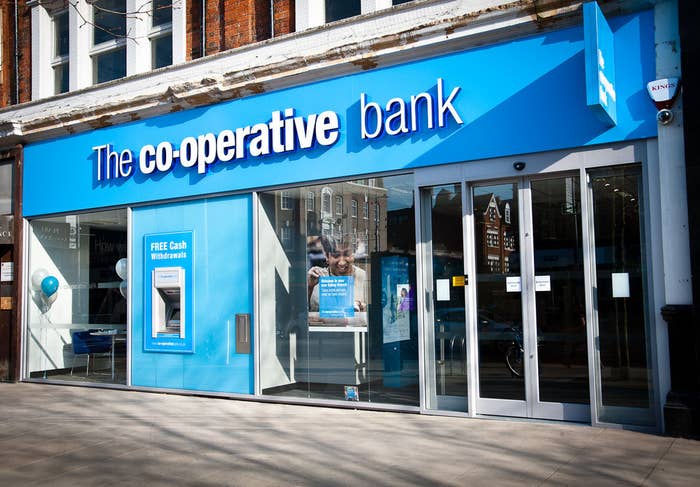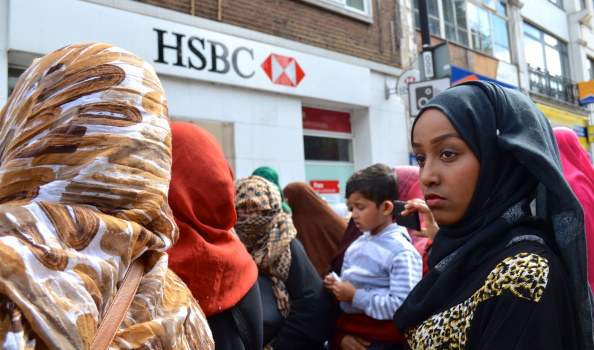British Islamic charities have warned that concerns about overseas terrorism are driving banks to close or freeze the accounts of a growing number of NGOs, and risk stopping them carrying out their work.

The Muslim Charities Forum (MCF), which represents more than 100 Muslim-led NGOs, told BuzzFeed News that more Islamic charities and voluntary groups were having their bank accounts closed or frozen, or having vital transactions being significantly delayed by banks concerned about their risk.
"It's affecting all Islamic organisations, big or small – and the more vulnerable groups are ones who work in high-risk areas," said Mohammed Shakir, communications officer for the MCF.
Shakir said crackdowns carried out by banks would, in future, have a greater impact on voluntary groups trying to carry out aid work in "high-risk areas" such as Syria and Iraq, citing cases of aid convoys who have had their accounts frozen or have experienced delays in processing donations.
"Smaller voluntary groups are likely to have bigger problems – if they're accused of being involved in illegal activity, they won't have the financial or public backing to challenge their bank or financial regulator."
He added that Islamic organisations having their accounts closed was "a trend that is continuing" and that the MCF had raised the issue on several occasions to individual banks, financial regulators, and the government.
The statement follows the closure of bank accounts held by two UK-based Islamic organisations, who were told they had fallen out of their bank's "risk appetite".

On Tuesday, Friends of al-Aqsa (FOA), a UK-based human rights group that advocates in support of Palestine, said it had been informed by the Co-operative Bank that its accounts would be closed as the organisation exceeded the bank's "risk appetite".
FOA's head of public affairs, Shaimul Joarder, told BuzzFeed News that the bank's decision to freeze its accounts would "make it difficult for the organisation to operate".
Despite informing the bank that the charity had not broken any laws, and that it did not transfer money abroad or accept money from other countries, it was not given a clear explanation as to why it was considered a risk, Joarder said.
In a statement to BuzzFeed News, a spokesperson for the Co-op said it would not comment on individual customers, but was "committed to abiding by international anti-money-laundering obligations".
"In common with all banks, we have to perform due diligence on our customers, their accounts, and the payments they make to ensure the bank complies with anti-money-laundering obligations and to manage the bank's risk," the spokesperson said.
"This is part of our normal banking processes and is an area where the bank has made some changes recently to bring it into line with the industry generally."
The spokesperson added that the decision did "not mean that we cannot or will not facilitate humanitarian, educational, medical, and human rights donations to the Gaza region".
On Sunday, Britain's biggest Muslim charity, Islamic Relief, which receives millions in grants from the Department for International Development, announced that HSBC had closed all of its bank accounts, due to fears that money could get into the hands of terrorist groups overseas.
Imran Madden, Islamic Relief's UK director, said the bank had terminated the charity's accounts at the end of last year, adding that "the bank felt it difficult to continue its relationship with us due to the nature of our work".
Madden added that Islamic Relief had several issues with HSBC prior to the account being closed, including payments that were "delayed for months", which affected its ability to provide aid to earthquake victims in Nepal.
In December 2014, the charity said an audit had found no evidence it had funded terrorism, following accusations from Israel and the United Arab Emirates. Islamic Relief works with a host of international organisations, including Unicef and the World Food Programme, and it was visited by David Cameron during the 2010 general election campaign.
Last year, a number of Muslim-led charities said their accounts had been closed without warning, after their banks deemed them too high a risk.

Other British-based Muslim organisations, including the Finsbury Park Mosque and the Cordoba Foundation, which held accounts with HSBC, and the Ummah Welfare Trust, which held an account with Barclays, claimed they had received letters informing them of plans to close their accounts, without providing any explanation.
In a statement to BuzzFeed News, an HSBC spokesperson said they consulted a "wide range of sources" when carrying out risk assessments on customers, and that such assessments would "typically include the type of activities the business is involved in, the jurisdictions in which it operates and the products and services it uses".
Simon Hailes, a spokesperson for Barclays, told BuzzFeed News that the bank minimises its risk by carrying out individual assessments on all its customers, but emphasised that it did not discriminate based on race or religion.
HSBC, Barclays, and the Co-operative Bank all told BuzzFeed News that they were committed to supporting Islamic charitable organisations operating in the third sector.

The British Banking Association (BBA), a lobby group for the financial sector, told BuzzFeed News that voluntary organisations would come under more scrutiny due to the increasing threat of international crime and terrorism.
A BBA spokesperson told BuzzFeed News that banks were coming under more pressure to crack down on money-laundering across borders.
"These requirements have been extended over recent years and the consequences of non-compliance can be severe," the spokesperson said. "New criminal techniques and geopolitical events have also changed the risks posed to banks.
"Banks adopt a risk-based approach to financial crime compliance, in line with UK and international rules. Any decision to exit a relationship is not taken lightly and involves consideration of a range of factors."
